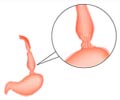Researchers are trying to determine whether or not a gel treatment can reduce the size of tumors in patients with esophageal cancer non-surgically.
Researchers are trying to determine whether or not a gel treatment can reduce the size of tumors in patients with esophageal cancer non-surgically.
The researchers at Rush University Medical Center have revealed that the unique drug therapy delivers a highly concentrated dose of chemotherapy injected directly on to the hard-to-reach tumors in the esophagus.Esophageal cancer patients are usually diagnosed at very advanced stages. They have to undergo chemoradiation therapy, and may also have an esophagectomy, which is a surgical procedure to remove a part of or the entire esophagus.
"Patients with esophageal cancer have very few treatment options and life expectancy can be less than two years from first diagnosis. This also could potentially be a viable treatment option for patients who have inoperable tumors located in their esophagus," said Dr. Sohrab Mobarhan, principal investigator of the study and clinical director of the Coleman Foundation Comprehensive Clinic for Gastrointestinal Cancers at Rush.
The researcher have revealed that the experimental drug, known as OncoGel, made of two major components: the ReGel drug delivery system, which is a gel made up of ingredients used in biodegradable stitches, and paxclitaxel, a well established, FDA-approved anti-cancer chemotherapy agent.
They say that patients receive a one-time injection of OncoGel during an endoscopy.
"In pilot studies, OncoGel has been shown to continuously release paclitaxel, which is the chemotherapy agent, in concentrated doses at a higher magnitude than in just delivering it through the blood for up to six weeks," said Mobarhan.
Advertisement
A person could ultimately develop cancer of the esophagus as a result of developing Barrett's.
Advertisement
In an earlier phase of the study of OncoGel in patients with late stage inoperable esophageal cancer, 70 percent of patients had a reduction in tumor volume when OncoGel was used in combination with radiotherapy.
The researchers also observed that, after treatment, biopsy samples did not contain tumor cells in almost 40 percent of patients.
Source-ANI
ARU












